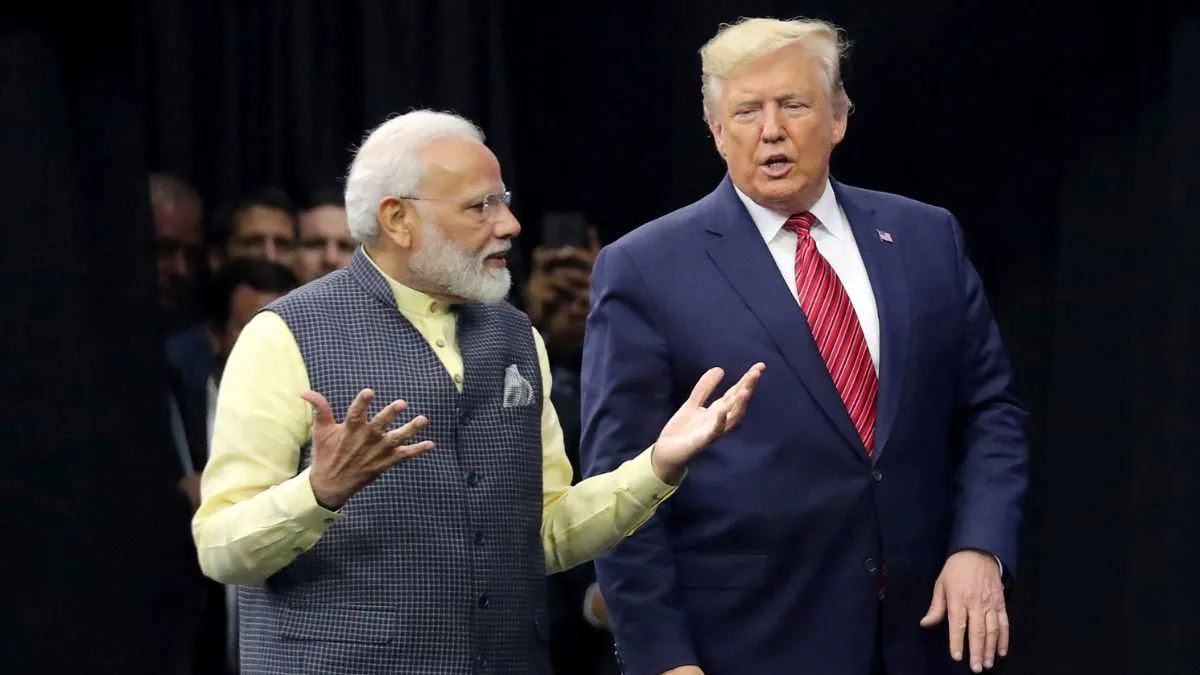- By Shivangi Sharma
- Tue, 04 Mar 2025 04:39 PM (IST)
- Source:JND
India and the United States are working toward a trade agreement that includes duty reductions and concessions to strengthen their economic ties. Commerce Minister Piyush Goyal recently stated that both countries could offer mutual concessions as their economies complement each other. Free trade agreements generally involve eliminating or significantly reducing customs duties on most traded goods, alongside easing norms to promote trade in services and investments.
During US President Donald Trump's first term, both nations discussed a mini-trade deal, which was later shelved by the Joe Biden administration, as it was not in favor of such agreements. In 2023, US- India bilateral trade in goods and services reached USD 190.08 billion, comprising USD 123.89 billion in goods and USD 66.19 billion in services. India's merchandise exports to the US stood at USD 83.77 billion, while imports were USD 40.12 billion, leaving a trade surplus of USD 43.65 billion in India's favor.
Concerns Over Trump's Reciprocal Tariff Proposal
Trump's proposal to impose reciprocal tariffs from early April on trading partners, including India, has raised concerns among Indian exporters in sectors like automobiles and agriculture. Analysts from Citi Research estimate potential annual losses of around USD 7 billion for India. During his visit to the US, Goyal is expected to seek clarity on the new tariffs and explore strategies to mitigate their impact on Indian trade. The discussions will also include possible concessions from India and a broader trade agreement to lower tariffs and enhance bilateral trade.
On Trade, I have decided, for purposes of Fairness, that I will charge a RECIPROCAL Tariff meaning, whatever Countries charge the United States of America, we will charge them - No more, no less!
— Donald J. Trump (@realDonaldTrump) February 17, 2025
For purposes of this United States Policy, we will consider Countries that use the…
ALSO READ:'Why Centre Didn't Set Up Institution To Teach Tamil In North': MK Stalin On Language Row
How India Is Trying To Avert Tariff War
To counter potential US tariff hikes, India is considering lowering tariffs on more than 30 products and increasing imports of US defense and energy goods. According to a report by The Economic Times, citing Nomura research, India's tariff rates remain relatively high compared to other nations, making it vulnerable to US retaliatory measures. The US is India's largest export market, accounting for approximately 18 per cent of total exports, which contributed 2.2 per cent to India's GDP in FY24.
Indian officials are reportedly discussing reducing duties on automobiles, agricultural products, chemicals, critical pharmaceuticals, medical devices, and electronics. These efforts extend beyond recent tariff reductions by Prime Minister Narendra Modi’s administration on high-end motorcycles and bourbon whiskey, items exported by the US but with limited sales in India.
The US aims to increase exports of energy and weapons to India, sectors where Russia currently holds a strong presence. Washington also seeks to expand exports of industrial goods, automobiles, and agricultural products. India is evaluating a list of products that it imports from other nations but not from the US, with the intention of increasing its purchases from American suppliers.
Trump's Trade Strategy And Its Impact On India
On February 13, Trump signed a directive instructing his administration to propose reciprocal tariffs, which could reshape America's trade relationships globally. Trade policy expert Deborah Elms from the Hinrich Foundation noted that under Trump’s plan, a broad range of perceived unfair trade actions could be factored into tariff calculations. This could expose India to higher tariffs on its exports to the US in the near future.
Piyush Goyal’s Sudden Visit To US
Commerce Minister Piyush Goyal’s visit to the US comes amid concerns over Trump’s proposed tariffs. According to Bloomberg, Goyal’s previously scheduled meetings were cancelled, and his itinerary is now open until March 8. His discussions in the US will focus on obtaining clarity about the proposed tariffs, assessing their impact on India, and exploring potential trade agreements aimed at reducing tariffs and boosting bilateral trade.
With trade relations between India and the US at a critical juncture, the outcome of these negotiations will play a crucial role in shaping future economic ties between the two nations.


